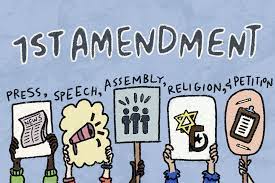Two recent Cases have reignited debate over free speech in schools and colleges, and how far the First Amendment goes when students post online.

At Texas State University, a student was unenrolled after posting a video mocking the death of conservative commentator Charlie Kirk, who was fatally shot at Utah Valley University on September 10. The video drew national backlash, including from Texas Governor Greg Abbott.
A similar case reached the U.S Supreme Court in 2021. High school student Brandi Levy was suspended from her cheerleading team after posting a profanity-filled Snapchat off campus. The court ruled in her favor, saying public schools have limited authority to punish off-campus speech.
To hear how students feel about these issues, I sent out a survey.
Should students be allowed to express offensive opinions on or off-campus?
“There should be an open exchange of ideas… There may be extreme exceptions, but I think the threshold is far too strict now.”
—Daniel R.
Can Schools Punish off-campus social media posts?
“It depends on the case. Just because you have a right to say something doesn’t mean it’s always wise — especially on social media.”
— Daniel R.
“Yes, if they involve bullying.”
— Charles Hennen Barrow
“Public schools — no. Colleges, private schools — yes.”
— Anderson Ihrig
“No, because students’ behavior outside of school shouldn’t be tied to school discipline. The First Amendment protects their opinions.”
— Leah Trejo
“No, unless the posts incite violence.”
— Edward Riggs
Did Texas State make the right decision?
“No. The First Amendment exists for a reason. Mocking Kirk was wrong, but unenrolling the student violates his rights.”
— Edward Riggs
“No, people make jokes all the time. The school had the right to dismiss him, but I don’t think they should have.”
— Charles Hennen Barrow
“If nothing in the college’s rules prohibits it, then yes. Posting something publicly where people are grieving can lead to consequences.”
— Daniel R.
“I somewhat agree, but I might be biased. The school should’ve asked for student input first, but it was their decision to make.”
— Anderson Ihrig
“No. His actions weren’t tied to the university. Offensive or not, the First Amendment protects him.”
— Leah Trejo
Why This Matters
The First Amendment protects freedom of speech, but it doesn’t mean speech is always without consequences. The Supreme Court’s decision in Mahanoy Area School District v Brandi Levy made it clear that public schools must be careful when disciplining students for off-campus speech, but it didn’t give a clear answer for every situation.
In colleges, especially ones like Texas State, students still have First Amendment protections. However, schools also have codes of conduct, and they often face pressure to respond when speech is seen as hateful, disrespectful, or harmful.
The line between free speech and inappropriate behavior is still being debated, not just in courts, but on campuses across the country.



